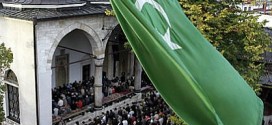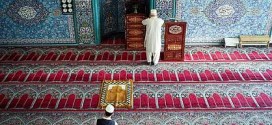Decoration as an Instrument for Enhancing the Real Qualities of a Thing
Assoc. Prof. Dr. Spahic Omer
Kulliyyah of Architecture and Environmental Design
International Islamic University Malaysia
E-mail: spahico@yahoo.com
There are two types of decoration: decoration as an instrument of deception, and decoration which enhances the real and original qualities of a thing. About the latter the Qur’an says:
{Indeed, We have adorned the nearest heaven with an adornment of stars.} (Qur’an 37: 6)
{And We have placed within the heaven great stars and have beautified it for the observers.} (Qur’an 15: 16)
{Have they not looked at the heaven above them – how We structured it and adorned it and [how] it has no rifts?} (Qur’an 50: 6)
{And know that among you is the Messenger of Allah. If he were to obey you in much of the matter, you would be in difficulty, but Allah has endeared to you the faith and has made it pleasing in your hearts and has made hateful to you disbelief, defiance and disobedience. Those are the [rightly] guided.} (Qur’an 49: 7)
{The example of [this] worldly life is but like rain which We have sent down from the sky that the plants of the earth absorb – [those] from which humans and livestock eat – until, when the earth has taken on its adornment and is beautified and its people suppose that they have capability over it, there comes to it Our command by night or by day, and We make it as a harvest, as if it had not flourished yesterday. Thus do We explain in detail the signs for a people who give thought.} (Qur’an 10: 24)
The Prophet (sa) also referred to the subject of decoration as an instrument for enhancing an entity’s true qualities on many occasions:
“Decorate your reading of the Qur’an with your voices.”
In addition, one of the Prophet’s supplications is as follows:
“O Allah endear faith to us, and make it beautiful in our hearts.”
He (sa) also prayed:
“O Allah, adorn us with the beauty of belief.”
On another occasion when he implored Allah for rain, the Prophet (sa) uttered the following:
“O Allah, send down upon us on our earth its ornaments (that is, send down rain and bring forth therewith the earth’s plants which are the former’s decoration).”
Moreover, the Prophet’s mosque in Madinah, when first built, was extremely simple in its form. It consisted of an enclosure with walls made of mud bricks and an arcade on the qiblah side made of palm-trunks used as columns to support a roof of palm-leaves and mud. There were no decorative elements whatsoever within it or outside it. The same was the case with all early mosques.
However, the Prophet’s biographers have reported that some of the Prophet’s Companions from the ranks of Ansar [helpers of Madinah] once brought some money to the Prophet (sa) and told him: How long shall we pray under these palm-leaves? Take this, adorn the mosque [that is, improve its physical condition].
The Prophet (sa) did not reprimand them and their proposal but instead replied: I have no intention to differ from my brother Moses; an arbour like the arbour of Moses.
The arbour of the Prophet Moses (as) is said to have been so low that he could touch the roof if he raised his hand; or, when he stood up, his head touched it, as stated in another report. However, it goes without saying, the Prophet (sa) did not prohibit decorating mosques altogether.
According to a proverb attributed to an early Muslim sage, “Knowledge is adorned by the forbearance and prudence of scholars.”
From the above, we can infer that the concept of decoration used to enhance the original qualities of an entity involves no camouflage or disguise. Nor do the decorative themes and methods applied stand between a thing and a beholder revealing to the latter not what the former actually is, but what it is not. Instead, this brand of decoration and beautification accounts for an extension and enhancement of an entity’s substance by the use of appropriate themes and channels – sometimes more and sometimes less. So important is such a brand of decoration that it not only denotes an enhancement of a thing’s actual qualities but also becomes an integral part thereof.
These decorative representations open new ways to view reality and an entity’s many layers. Due to decoration and beautification, people pay better attention to things and events and are able to comprehend and appreciate them. In some cases, it may be that people do not recognize the true significance of events or things without their supplementary decorative designs and features. Others, however, view decoration merely as complementary and not essential to the nature of an event or entity.
Furthermore, such decoration has become an indispensable facet at all levels of creation, including that which belongs solely to the Creator of the heavens and the earth. However, decoration for enhancement is applied only to the positive aspects of existence. The negative aspects, those generated by Satan and his followers from among the jinn and humans, are incapable of being decorated or beautified. Attempting to decorate the negative aspects of an entity is a form of deception – the type of decoration from the first category discussed previously. In fact, any attempt to decorate the unfavourable aspects of an entity can only trigger more wrongdoing and wider deceit.
According to Islam, this terrestrial life is a positive affair, which has been flawlessly envisaged and executed by Almighty Allah. Whatever good happens to humankind on earth is only from Allah. On the contrary, whatever evil happens to humankind is due to their own wrongdoings. Thus, on earth, goodness and beauty are the rule, and evil and ugliness are the exception. Virtue is the norm and sin is the aberration. Consequently, the decorative paradigms, which underscore the spiritual significance of the notion of creation and which are aimed at enhancing the real and original qualities of wholesome things are the rule on earth whereas deceptive decorative schemes are the exception confined only to those who willingly rebel against their inherent character and the heavenly will and plan.
We have seen earlier that Allah, the only Creator and Fashioner, has perfectly adorned His creation. This is readily noticeable as much in the grandest as in the simplest manifestation of Allah’s wisdom and power in the design and function of the universe. The purposes of Allah’s beautification of the world are mainly two. Firstly, such beautification is a blessing to humankind, which they are bidden to observe, marvel at, and obtain a good deal of sensual, mental and even spiritual pleasure from. Secondly, the world’s emphasized beauty aims to draw people’s attention towards contemplating the countless signs of Allah that have been inscribed as much, and as well, on the small and slight as on the great and vast, which, in turn, lead their intuitive observers to an appreciation of a higher order of things.
Creating ex nihilo (from absolute nothingness) is both the right and power of Allah alone. Such creation cannot be ascribed to humankind. Humans were and will remain forever short of enjoying a power of bringing into being anything without making use of the available raw materials and elements created for them in nature. Indeed, everything that humans invent, conceive, concoct and create, is only possible thanks to the unbounded bounties and munificence from Allah, which humans only discover, manipulate, process, use, and reuse in different ways most convenient and efficient for them.
Consequently, humankind’s civilised and cultural ‘creations’ are a relative thing. They are not really ‘creations’ but only the possessions of humankind. As such, humans neither create nor possess anything.
{To Allah belongs whatever is in the heavens and whatever is in the earth. Whether you show what is within yourselves or conceal it, Allah will bring you to account for it. Then He will forgive whom He wills and punish whom He wills, and Allah is over all things competent.} (Qur’an 2: 284)
Everything around humans has been loaned to them so that they can carry out their duty of vicegerency in a responsible and unhindered manner. Their duty is no more than that. Even humans’ lives are not their own. Their lives belong to their Lord, and, if needed, they must sacrifice their lives for their Lord and His cause:
{Indeed Allah has purchased from the believers their lives and their properties [in exchange] for paradise. They fight in the cause of Allah, so they kill and are killed. [It is] a true promise [binding] upon Him in the Torah and the Gospel and the Qur’an. And who is truer to His covenant than Allah? So rejoice in your transaction which you have contracted. And it is that which is the great attainment.} (Qur’an 9: 111)
It follows, therefore, that the legitimacy of human ‘creations’ is based on the strengthening of a human’s relationship with their Lord and with the rest of His creation.
The idea of decoration and beautification for the purpose of enhancing the actual qualities of a thing is not an exception to this rule. People are permitted to do so as long as the following conditions are met:
1) Such decoration is affordable.
2) It does not lead to transgression, such as wastefulness, showing off or unhealthy competition.
3) It propagates the principles, values, teachings and standards that typify the objectives of the divinely revealed truth.
4) It encourages people’s contemplation of the actual significance of life’s terrestrial and heavenly realities.
Finally, it must be borne in mind always that the whole of Allah’s creation is innately beautiful. The same is true with regard to anything that serves the purpose of truth. The best adornment that can be conferred on the things made by people is the sincerity of intentions, the integrity of goals and objectives, and, last but not least, the appropriate functions of the ‘created’ things. If no extra decorative substance is attached to such things, they are and will remain beautiful in the sight of both Almighty Allah and the people of righteousness.
 Dzemat Braunau
Dzemat Braunau


